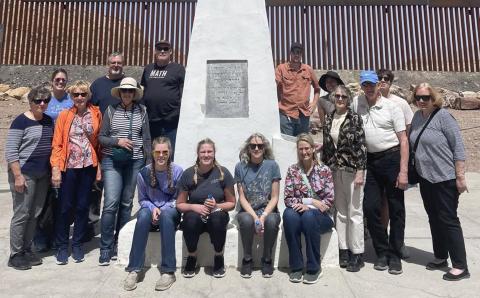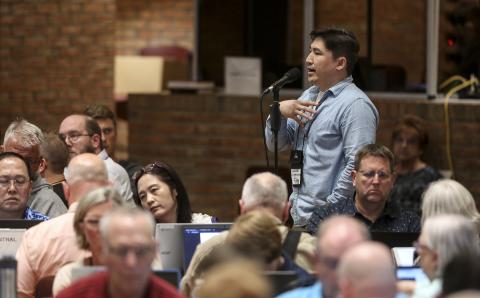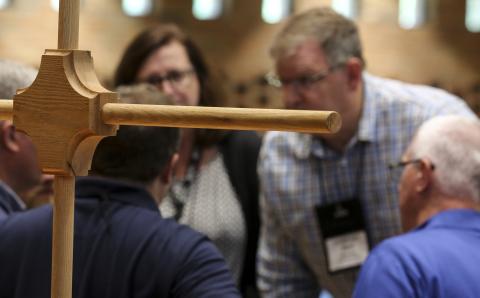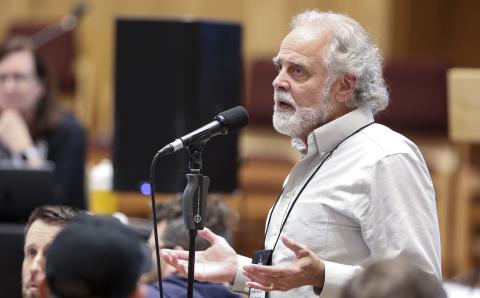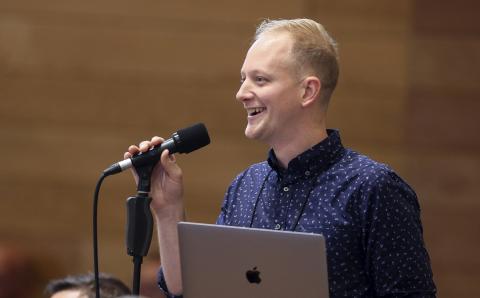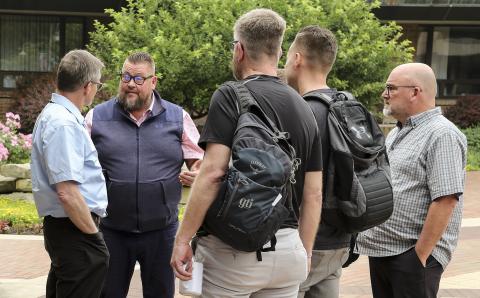During the pandemic, an Indigenous prayer camp developed into a tent city named Pekiwewin. I passed by the prayer camp often on my way to my work at a local inner-city agency. Some of my friends lived there. One day I biked up to the camp, and the first person I saw was someone I knew from my time at The King’s University. He was volunteering to cook the meal that evening. The next people I saw were two members of the tent city. One was an Indigenous woman looking for a shopping cart; she was in the process of moving homes after a conflict with a neighbor. The other person was a man I had seen around the inner city. He generously offered to give me a tour of his home.
My guide told me that he felt safe and connected to others at Pekiwewin. He showed me where his tent was. His friend had given it to him, and now they were in the same neighborhood in the camp. Walking, we saw that the Indigenous woman I had previously met had found a cart and was enlisting others to help with the move. One leader of the camp told us that Pekiwewin is a true community. There is harmony and joy, but also conflict and general craziness. Such is typical for those experiencing homelessness.
This kind of community might be seen as unusual or even dangerous to many of us who are used to four walls and a fence. I wonder, however, how our Lord views those who live in tents. In Scripture, one of the most formative experiences for the Israelites was their time in the wilderness. The Lord wanted the memory of this experience forever etched onto their hearts and bodies. He commanded Israel to enact Sukkot, the festival of tents. In the book of Jeremiah, we meet a nomadic people known as the Rekabites. They were obedient to their ancestors’ legacy, including the command to forever live in tent cities. Because of their obedience, the Lord blessed them (Jer. 35:19). Not all Israelites became city dwellers or land-owning farmers after their time in the desert. Scholars argue that nomads, farmers, and city dwellers lived together in Israel, with their movements depending on the abundance of the resources of the land and the seasons.
Unlike Israel, history has tended to favor houses over tents. Historians note that nomads are often seen as suspicious or even dangerous. The stripping away of the Indigenous cultures within Turtle Island (a term some Indigenous people use to refer to North America) is one horrific repercussion of this deep prejudice. Even the faithful Rekabites, according to legend, were attacked for their way of life.
This pervasive worldview has affected the way we view cities as opposed to tent cities. While cities are celebrated for overcoming wild land and draining its abundance, tent cities are criticized for their temporary nature, unruly like the wind or a gopher sneaking about. In fact, cities try to eradicate these tents through policies and practices that some say are based on Western societal values of possession, control, and mastery.
In his book After Whiteness, theologian Willie Jennings argues that these three values have morphed into “demonic” virtues we embody and idols we cherish. The idol of possession—the need for ownership and acquisition of material things—stems from a deformed view of human maturity in which humans evolve from being owned to becoming owners of land and bodies. The idol of control is the need to force all things into a monolithic image, procedure, or ideal—it is easier to control things that are the same. Finally, the idol of mastery praises self-sufficiency, individualism, and domination—people want to possess many things and control everything. It is my contention that when we fear tent cities and their citizens, we are actually reacting to the unveiling of these idols we zealously worship.
These idols constitute what the great African theologian Augustine described as the City of the World, in which “both the rulers themselves and the people they dominate are dominated by the lust for domination.” Those who seek to possess, control, and master are driven by this lust for domination.
In contrast stands the City of God. This city is not merely a grouping of houses and businesses. Rather, like ancient Israel, it is a diverse array of peoples and creation, including diverse ways of relating to the land. “In the City of God,” declares Augustine, “all citizens serve one another in charity, whether they serve by the responsibilities of office or by the duties of obedience.”
In Pekiwewin I experienced the Tent City of God. There I was invited to imagine an alternative to these idols. Instead of striving to possess and hoard things, my community guide gave me a comb from a toiletry bag someone else had given to him. Instead of seeking to control and dominate a community by mandating how one ought to live, Pekiwewin was a place where nomads, housed volunteers, and guests like myself were invited into community. At the end of my tour, my guide invited me into his tent. He offered a mattress to lie on and some food. Even though I had a home very different from his, I felt welcomed and loved.
Instead of being a collection of independent masters, the tent city was a place where everyone depended on each other. It was also a place where people must learn to depend on the Creator for their needs, safety, and sense of belonging. In my community guide’s tent, we prayed. We quoted our favorite Bible passages. Mine was Psalm 23. His was John 1. In this Tent City of God, I was presented new values of generosity, charity, and interdependence.
To be sure, tent cities have their own demons to contend with. However, I believe that inside their tents is salvation—or at least healing—from our idolatries. As we learn from the tent city’s inhabitants how to resist our idols, I pray that we might also be used as instruments of our Lord to heal the brokenness they too face.
May the Lord of all peoples, nomads, and city dwellers walk with us into the wilderness ahead.
Discussion Questions
- What were your feelings about tent cities? Have you ever seen or experienced one in person?
- Do you agree with the author’s description of the idol of possession? Do you agree that this value has become an idol in our modern Western society?
- How do you react to the description of the idol of control? Are there, either past or current, examples of this idolatry in our world?
- What is the difference between the idol of mastery and the idol of control? How do we guard ourselves against falling into unintentionally following these idols?
About the Author
Jeremiah Damir Bašurić is a commissioned pastor at mosaicHouse Church, a multicultural Reformed church plant in Edmonton, Alta. He is also a chaplain who through an inner-city organization journeys with many people the Bible calls “rich in faith.”


